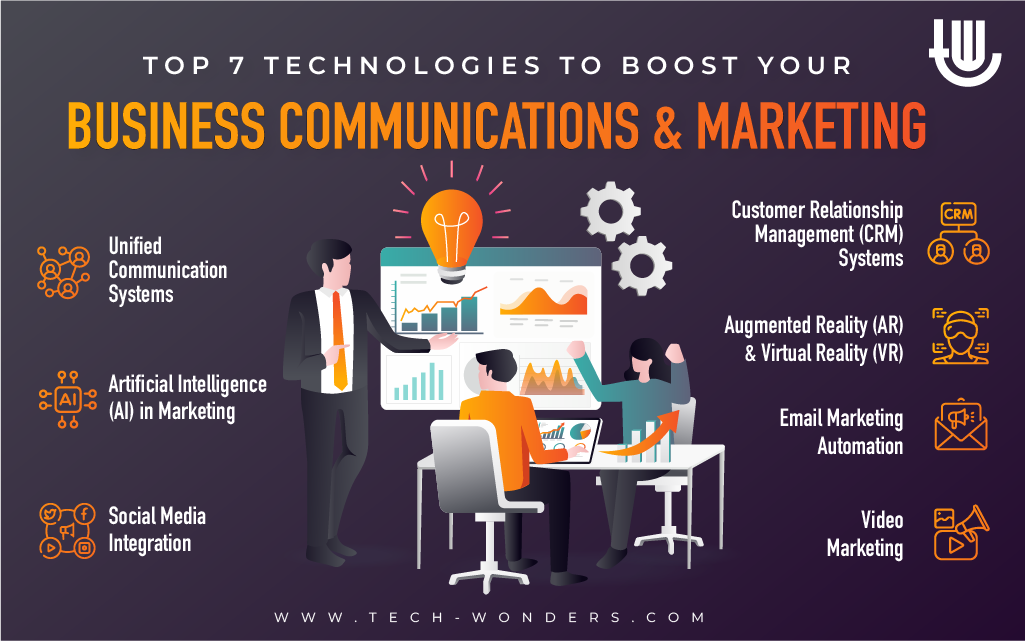
In today’s rapidly evolving business landscape, effective communication and marketing are crucial for success. The advent of advanced technologies has opened up new avenues for businesses to enhance their outreach and engagement. From streamlined internal communications to cutting-edge marketing strategies, technology is playing a pivotal role in reshaping the way businesses connect with their audience. In this article, we will explore the various technologies that can significantly boost your business communications and marketing efforts.
Transforming Business Communications and Marketing: Harnessing the Power of Technology
Unified Communication Systems:
To streamline internal communications, businesses are increasingly turning to Unified Communication (UC) systems. These systems integrate various communication tools like voice calls, video conferencing, instant messaging, and email into a single platform, promoting seamless collaboration among team members. UC systems not only enhance internal communication but also contribute to increased productivity and efficiency.
Popular UC tools such as Microsoft Teams, Slack, and Zoom provide features like file sharing, real-time collaboration on documents, and virtual meeting spaces, enabling teams to work together regardless of geographical locations. These platforms foster a culture of instant communication, reducing delays and enhancing overall organizational agility.Artificial Intelligence (AI) in Marketing:
Artificial Intelligence has revolutionized the field of marketing, offering advanced tools and techniques to understand customer behavior, personalize content, and automate marketing processes. Machine learning algorithms analyze vast amounts of data to extract valuable insights, helping businesses make informed decisions and create targeted marketing campaigns.
AI-powered chatbots are becoming increasingly popular in customer service, providing instant responses to queries and facilitating smoother interactions. Personalization engines leverage AI to analyze customer preferences and deliver tailored content, enhancing the overall customer experience. By automating repetitive tasks, AI allows marketing teams to focus on strategic planning and creativity.Social Media Integration:
Social media platforms have become indispensable tools for marketing and communication. Integrating these platforms into your overall marketing strategy can significantly boost your brand’s visibility and engagement. Technologies like social media management tools, analytics platforms, and chatbots help businesses effectively manage their social media presence.
Tools like Hootsuite and Buffer allow businesses to schedule posts, monitor social media activity, and analyze performance metrics across multiple platforms. Advanced analytics tools provide valuable insights into audience demographics, preferences, and engagement patterns, helping businesses refine their marketing strategies for better results.
In today’s era, it is impossible to use these technologies without internet. And everyone deals their business affairs mostly on mobile. So, keeping this in mind, we should also ensure the availability of internet at all times and when such a situation occurs, we do not have internet data plan, then we should also know how to get free data.Customer Relationship Management (CRM) Systems:
CRM systems are essential for managing and nurturing customer relationships. These platforms consolidate customer data, interactions, and feedback, providing businesses with a comprehensive view of their customer base. CRM systems help streamline communication with customers, track sales leads, and personalize marketing efforts.
Platforms like Salesforce, HubSpot, and Zoho CRM offer features such as lead management, email marketing automation, and customer segmentation. By leveraging CRM technology, businesses can tailor their marketing messages to specific customer segments, improving the relevance and effectiveness of their campaigns.Augmented Reality (AR) and Virtual Reality (VR):
AR and VR technologies are gaining prominence in marketing by offering immersive and interactive experiences. Businesses can use AR to enhance product displays, allowing customers to visualize products in their real-world environment through mobile apps or AR glasses. VR, on the other hand, can be employed for virtual product demonstrations, creating engaging and memorable experiences.
For example, furniture retailers can use AR to enable customers to see how a piece of furniture would look in their homes before making a purchase. Similarly, VR can be utilized for virtual tours or simulations, providing customers with a unique and interactive experience.Email Marketing Automation:
Email marketing remains a powerful tool for businesses to communicate directly with their audience. However, manually managing large email lists and crafting personalized messages can be time-consuming. Email marketing automation platforms streamline this process by allowing businesses to set up automated campaigns based on user behavior, preferences, and interactions.Video Marketing:
Video content has become a dominant force in online marketing. The rise of platforms like YouTube, TikTok, and Instagram has fueled the demand for engaging and shareable video content. Businesses can leverage video marketing to tell their brand story, showcase products, and connect with their audience on a more personal level.
Live streaming, 360-degree videos, and interactive video content are some of the trends reshaping the video marketing landscape. Tools like Adobe Premiere Pro, InVideo, and Animoto enable businesses to create professional-looking videos without the need for extensive technical expertise.
Conclusion:
In the fast-paced and competitive business environment, leveraging technology is no longer an option but a necessity. The technologies mentioned above can transform the way your business communicates internally and engages with your target audience. By adopting these tools strategically, you can enhance collaboration, personalize marketing efforts, and stay ahead of the curve in an ever-evolving digital landscape. Embrace the power of technology to unlock new opportunities, strengthen your brand, and propel your business to greater heights in the modern era of communication and marketing.